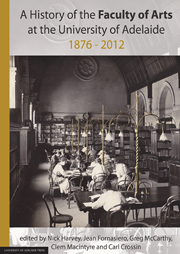Book contents
- Frontmatter
- Contents
- List of Contributors
- 1 The Faculty of Humanities and Social Sciences and the BA Degree at the University of Adelaide since 1876
- 2 Webs of Significance: an Ethnographer's Account of Anthropology at the University of Adelaide from 1973 to 2011
- 3 The History of the Centre for Asian Studies at the University of Adelaide
- 4 Classics at the University of Adelaide (1874–2012)
- 5 English and Creative Writing: ‘the abode of … literature; the home of poetry and fiction’
- 6 A Tale of Resilience: the History of Modern European Languages at the University of Adelaide
- 7 Geography, Environment and Population at the University of Adelaide, 1904–2012
- 8 Gender Studies and Social Analysis
- 9 History
- 10 The History of Aboriginal Languages and Linguistics at the University of Adelaide
- 11 The Digital, Participatory and International Turn: Media at the University of Adelaide
- 12 Musical fusions
- 13 Philosophy at the University of Adelaide
- 14 Politics at the University of Adelaide
- Appendices
10 - The History of Aboriginal Languages and Linguistics at the University of Adelaide
Published online by Cambridge University Press: 05 June 2013
- Frontmatter
- Contents
- List of Contributors
- 1 The Faculty of Humanities and Social Sciences and the BA Degree at the University of Adelaide since 1876
- 2 Webs of Significance: an Ethnographer's Account of Anthropology at the University of Adelaide from 1973 to 2011
- 3 The History of the Centre for Asian Studies at the University of Adelaide
- 4 Classics at the University of Adelaide (1874–2012)
- 5 English and Creative Writing: ‘the abode of … literature; the home of poetry and fiction’
- 6 A Tale of Resilience: the History of Modern European Languages at the University of Adelaide
- 7 Geography, Environment and Population at the University of Adelaide, 1904–2012
- 8 Gender Studies and Social Analysis
- 9 History
- 10 The History of Aboriginal Languages and Linguistics at the University of Adelaide
- 11 The Digital, Participatory and International Turn: Media at the University of Adelaide
- 12 Musical fusions
- 13 Philosophy at the University of Adelaide
- 14 Politics at the University of Adelaide
- Appendices
Summary
Whilst the Discipline of Linguistics at the University of Adelaide is relatively new, commencing in 1993 with the appointment of Professor Peter Mühlhäusler as the ‘Foundation Professor of Linguistics’, the University's work and engagement with Aboriginal languages dates back more than 65 years earlier, including the appointment of a ‘Professor of Australian Linguistics’ in 1970. Even though Linguistics is relatively small in Adelaide, both by national and international standards, a number of very important developments emerged first at the University of Adelaide within the field of Aboriginal languages and linguistics.
The beginnings of engagement through the University of Adelaide with Aboriginal languages research dates back to the establishment of the Board for Anthropological Research (BAR) at the University in 1926. Among other things, the BAR encouraged the collection of vocabularies of Aboriginal languages. E. H. Davies, Professor and Dean of the Faculty of Music 1919–1947, was the ‘first person in Australia to record, transcribe and write about aboriginal [sic] tribal and ceremonial songs and singing’ in the period 1926–1930, when he accompanied BAR expeditions to Central Australia. The arrival of John Aloysius FitzHerbert, appointed as Professor of Classics at the University of Adelaide in 1928, gave the BAR a much stronger focus on Aboriginal languages. In 1930–31, FitzHerbert established a committee to devise a phonetic system suited to typewriters for the transcription of Aboriginal languages. This committee consisted of FitzHerbert together with Norman Tindale from the South Australian Museum and Charles Chewings.
- Type
- Chapter
- Information
- A History of the Faculty of Arts at the University of Adelaide1876-2012, pp. 265 - 298Publisher: The University of Adelaide PressPrint publication year: 2012
- 2
- Cited by



